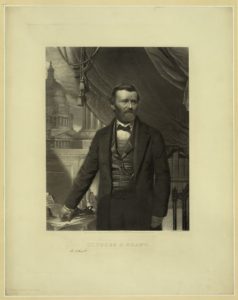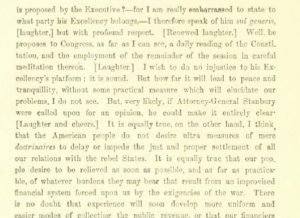Harold Holzer called Abraham Lincoln’s speech at the the Cooper Institute in New York City on February 27, 1860 his “watershed, the event that transformed him from a regional leader into a national phenomenon. Here the politician known as frontier debater and chronic jokester introduced a new oratorical style: informed by history, suffused with moral certainty, and marked by lawyerly precision.” Mr. Lincoln’s address so impressed the public that it was more plausible that he eventually became the Republican nominee for president over William H. Seward and went on to win the 1860 election. 150 years ago this week there was another meeting at the Cooper. Its purpose was more explicitly political. Unlike the February 1860 meeting the star of the show was already famous throughout the nation. He didn’t give a speech; as a matter of fact, he wasn’t even on site. Nevertheless, a “grand mass meeting” gathered to show their support and to “nominate” General U.S. Grant for U.S. president about eleven months before the 1868 election.
From The New-York Times December 5, 1867:
GRANT FOR PRESIDENT.
_________
Immense Mass Meeting at the Cooper Institute.
________
Gen. Grant the Candidate of the Loyal Union People of New-York.
________
Speeches by A.T. Stewart, Judge Hilton, F.B. Cutting, Gen. Sickles, Lyman Tremaine and Others.
________
The public feeling in favor of the nomination of Gen. GRANT for the Presidency, which has been rapidly increasing in this vicinity for some time past, culminated in a grand mass meeting at the Cooper Institute last evening, held in response to a call from a large number of our [prominent?] merchants, bankers and businessmen representing both of the leading parties. As the first public demonstration in favor of Gen. GRANT for President it was a great success. Seldom has the Cooper Institute been filled with a larger audience, or one better representing the various classes of our population, than the one assembled there last night. A good number of ladies were present. The hall was tastefully decorated for the occasion with the Stars and Stripes and the flags of the leading nations of the earth. Suspended at the rear of the platform was a life-size portrait of Gen. GRANT, while in front of the speakers’ desk a plaster cast of the hero represented him sitting at his ease in his chair smoking the inevitable cigar. Among the mottoes inscribed on the walls were: “The Constitution – it lives forever,” “The Union – it must and will be preserved,” &c. The following, among other prominent citizens, occupied seats upon the platform: Peter Cooper, A.T. Stewart, Wm. E. Dodge … [many others, including Daniel Sickles] [many speeches were given in the rest of the article] …
The mass meeting’s executive committee published a report of the proceedings (available at HathiTrust). Civil War general and Democrat Daniel Sickles began his speech by favorably comparing General Grant to George Washington, who was “commended to the American people, not by party platforms, not by political indorsement, but by his principles, and his character, and his deeds in the service of the nation.” He got off some zingers about President Johnson, who had fired Sickles as commander of the Second Military District (the Carolinas) back in August. The general made fun of Johnson’s well-known devotion to the Constitution. He closed by commending General Grant “because, of all men living, he is the truest embodiment of the great loyal millions who put down the rebellion because they loved the Union, and who desire peace now because they pray for its perpetuity.”
According to a document at the Library of Congress, possibly from 1867, not all Republicans wanted General Grant as their nominee in 1868, and they weren’t afraid to publish their feelings. Why would Republicans support a Democrat?:



![Sixteen reasons why our Republican party should not run Gen. Grant for president in 1868. [Sixteen reasons] American Republicans. [n. p. 1867?]. (LOC: https://www.loc.gov/item/rbpe.23600900/)](https://www.bluegrayreview.com/wp-content/uploads/2017/12/grantnot-republican-845x1024.jpg)
![Gen. Grant ([New York, N.Y.] : [George Stacy], [ca. 1865]; LOC: https://www.loc.gov/item/2017645220/)](https://www.bluegrayreview.com/wp-content/uploads/2017/12/1s05350v-1024x515.jpg)